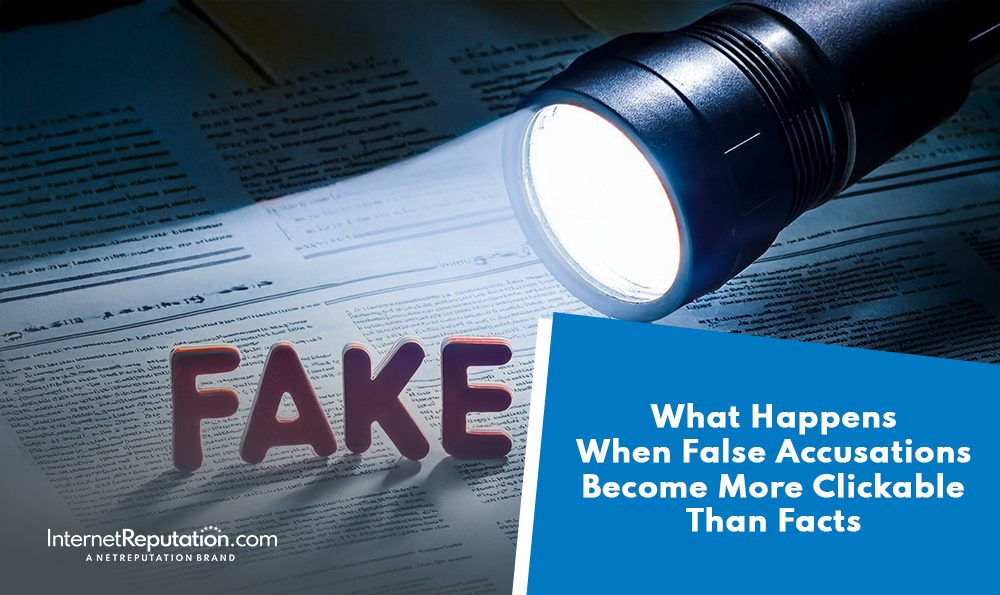What Happens When False Accusations Become More Clickable Than Facts

Digital headlines often shape public perception, and false accusations are now more likely to go viral than factual information. As social media posts spread faster than credible investigations, countless individuals are being wrongfully accused in the court of public opinion, often before any legal process has even begun. False allegations, whether in the workplace or personal relationships, can trigger severe legal, emotional, and financial consequences.
Why False Accusations Happen
False accusations arise from misunderstandings, personal vendettas, or, in some cases, malicious intent. In high-conflict situations—child custody battles, workplace disputes, or claims of sexual misconduct—emotions often override logic. As a result, false claims can emerge.
An alleged perpetrator may face accusations based solely on a vague complaint or an impulsive false statement. In the age of viral tweets and clickbait headlines, a single post can destroy someone’s reputation overnight.
The Real-World Consequences of False Claims
False allegations can devastate a person’s life:
- Criminal Charges: Filing a false police report can lead to arrest and prosecution, even without substantial evidence.
- Employment Fallout: Accused employees may be suspended, fired, or blacklisted—regardless of whether the claims are verified.
- Reputation Damage: Allegations of sexual assault, domestic violence, or child abuse can permanently stain someone’s reputation.
- Legal Penalties: Individuals who are wrongfully accused may face emotional distress, financial loss, and even imprisonment.
False accusations occur more often than many realize. While legal systems presume innocence until proven guilty, public opinion rarely extends that same courtesy.
The Role of Social Media and the Clickbait Economy
Social media magnifies false statements. The more sensational the post, the faster it spreads—and the more people believe it. In this digital echo chamber, truth takes a backseat to virality.
False accusers can easily use social platforms to circulate unverified stories. These posts can gain traction regardless of the intent, whether it is actual malice or reckless disregard for the truth. Law enforcement officers may act quickly under public pressure. Employers might prioritize optics over fairness, rushing to judgment before conducting proper investigations.
Legal Rights and Responsibilities When Falsely Accused
If you’re facing false accusations, it’s essential to understand your rights. Seek legal advice immediately. An experienced criminal defense attorney or defamation law expert can help you:
- Gather Evidence: Preserve text messages, emails, and social media posts. Corroborating evidence and witness statements can strengthen your defense.
- Know Your Rights: Whether you’re an accused employee or facing criminal charges, you’re entitled to legal representation and a fair investigation.
- Hire the Right Attorney: A law firm skilled in false accusation law or employment law can guide you through wrongful termination claims, workplace misconduct disputes, or breach of contract issues.
Legal Action Against False Accusers
If you’re wrongfully accused, you may have legal recourse:
- Defamation Lawsuit: If someone publicly made false claims with actual malice, you can file a defamation claim.
- Seek Compensation: Victims of false allegations may recover lost wages, emotional distress damages, and costs related to reputational harm.
- Civil and Criminal Penalties: In some states, making false accusations is a criminal offense. Your attorney can help you file charges or pursue a civil suit.
Preventing Damage from False Accusations
Being wrongly accused is overwhelming. But your response matters:
- Stay Calm: Don’t let emotion take over. Outbursts can be used against you.
- Present Evidence Early: Provide your legal team with relevant documents as soon as possible.
- Avoid Direct Contact: Don’t engage with your accuser. Let your attorney handle communication through proper legal channels.
The Broader Impact on Society
When false accusations become more clickable than facts, the public interest suffers. People lose faith in justice, legitimate victims hesitate to speak out, and workplace morale declines.
Legal experts warn that wrongful allegations erode trust in both the legal system and the media. They urge community leaders and journalists to prioritize due process over sensationalism.
The Importance of Reputation Management in the Digital Age
Reputation management plays a crucial role in mitigating the impact of false accusations. A single viral post can severely damage your online reputation, making it challenging to secure employment, establish relationships, or rebuild trust.
Professionals in this field help suppress damaging content, boost positive stories, and track online mentions. By combining legal action with innovative digital strategies, those who have been wrongfully accused can rebuild their online presence.
Reputation management is not just about putting out fires—it’s about protecting your future. With expert support, you can reclaim your narrative, restore peace of mind, and regain financial and professional stability.
Final Thoughts
False accusations carry serious consequences. Whether it’s a false police report, workplace dispute, or claim of sexual misconduct, the damage is often swift and lasting. But with expert legal guidance, reputation support, and a proactive plan, you can protect your rights, fight back, and move forward with confidence.


